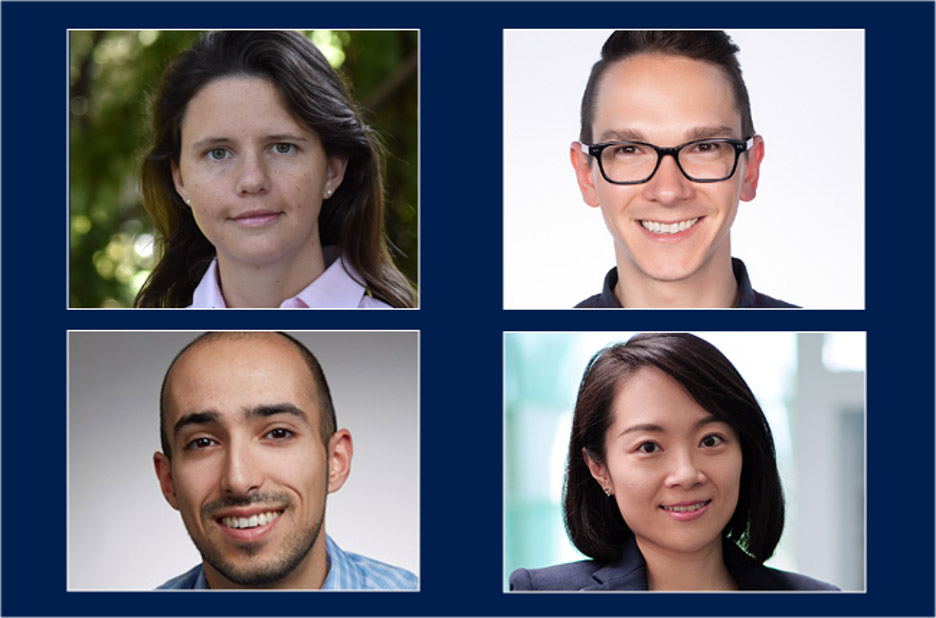
SEPTEMBER 8, 2020 • By Matthew Tierney
The Edward S. Rogers Sr. Department of Electrical & Computer Engineering (ECE) welcomed four new faculty members this summer who will be joining new and returning students for the start of the 2020 fall academic term.
“Our new faculty members demonstrate exceptional talent and bring diverse and innovative teaching and research perspectives,” says Professor Deepa Kundur, Chair of ECE. “I’m thrilled to welcome Professors Chapman, Jeffrey, Simpson-Porco and Zhou to ECE and look forward to working with them.”
The four new faculty members are:
Margaret Chapman, Assistant Professor
Professor Chapman’s research focuses on stochastic dynamical systems: uncertain systems that evolve over time. Using mathematical theory and data analysis, she looks to develop better ways to control these systems and to manage the risk of harmful outcomes despite real-world uncertainties.
Her emphasis is on safety-critical applications in healthcare and sustainable cities. The practical applications are broad: from the management of cancer to the design and operation of water systems. In addition, she develops new mathematical methods at the intersection of risk analysis, probability theory and control theory.
Professor Margaret Chapman earned her PhD in Electrical Engineering and Computer Sciences from the University of California. She received a U.S. National Science Foundation Graduate Research Fellowship and a Berkeley Fellowship for Graduate Study.
Read a Q&A with Professor Chapman.
Mark Jeffrey, Assistant Professor
Professor Jeffrey’s research lies in the areas of computer architecture and computer systems, spanning hardware, software and the interface between them.
In particular, he is looking at how parallelism — running many computations at the same time — can improve a computer system’s efficiency and sustain future performance scaling as the technological trend of exponential performance improvement slows down.
Professor Mark Jeffrey (EngSci 0T9, ECE MASc 1T1) is a U of T Engineering alumnus who earned his PhD degree from the Massachusetts Institute of Technology. He spent the past year as a Research Scientist at Facebook AI Research, working to improve systems for distributed training in machine learning.
Read a Q&A with Professor Jeffrey.
John Simpson-Porco, Assistant Professor
Professor Simpson-Porco’s research is in the area of automatic control, an interdisciplinary topic at the boundary between engineering and applied math. The broad goal of this research is to improve efficiency and reliability of the power grid and to move towards a renewable-centric energy system.
He focuses on fundamental problems, such as how to analyze control systems and how to design controllers, as well as application-driven solutions to problems of control and optimization in the energy sector.
Professor John Simpson-Porco received his PhD in Mechanical Engineering from the University of California, Santa Barbara. From 2016 to 2020, he was an Assistant Professor of Electrical and Computer Engineering at the University of Waterloo. He currently serves as an Associate Editor for IEEE Transactions on Smart Grid.
Read a Q&A with Professor Simpson-Porco.
Shurui Zhou, Assistant Professor
The goal of Professor Zhou’s research is to help globally distributed and interdisciplinary software teams collaborate more efficiently, especially in the context of modern open-source collaboration forms and the building of AI-enabled systems or scientific software.
She combines a wide range of research methods, drawing on advances in tooling and software engineering principles with insights from other disciplines, such as organizational theory and social computing.
Professor Shurui Zhou obtained her PhD from the Institute for Software Research, School of Computer Science at Carnegie Mellon University. During her time at CMU, she collaborated with researchers from different universities with different backgrounds, resulting in publications that have been presented at international conferences in software engineering.
For more information:
Jessica MacInnis
External Relations Manager
The Edward S. Rogers Sr. Department of Electrical & Computer Engineering
416-978-7997 | jessica.macinnis@utoronto.ca